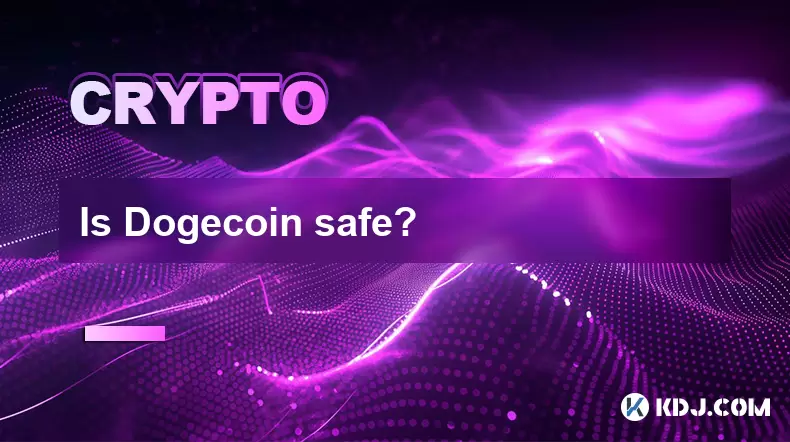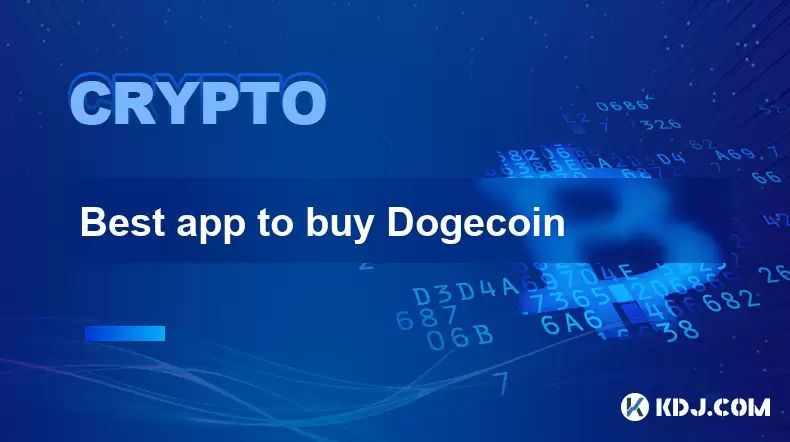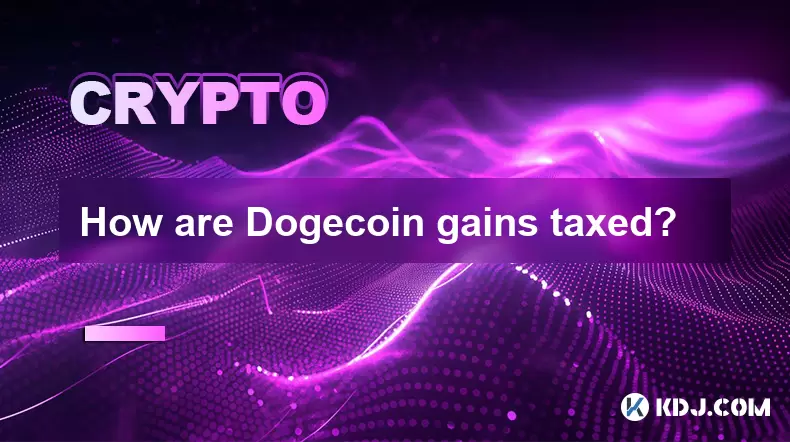-
 bitcoin
bitcoin $87959.907984 USD
1.34% -
 ethereum
ethereum $2920.497338 USD
3.04% -
 tether
tether $0.999775 USD
0.00% -
 xrp
xrp $2.237324 USD
8.12% -
 bnb
bnb $860.243768 USD
0.90% -
 solana
solana $138.089498 USD
5.43% -
 usd-coin
usd-coin $0.999807 USD
0.01% -
 tron
tron $0.272801 USD
-1.53% -
 dogecoin
dogecoin $0.150904 USD
2.96% -
 cardano
cardano $0.421635 USD
1.97% -
 hyperliquid
hyperliquid $32.152445 USD
2.23% -
 bitcoin-cash
bitcoin-cash $533.301069 USD
-1.94% -
 chainlink
chainlink $12.953417 USD
2.68% -
 unus-sed-leo
unus-sed-leo $9.535951 USD
0.73% -
 zcash
zcash $521.483386 USD
-2.87%
Is Dogecoin safe?
Dogecoin's security relies on its decentralized Proof-of-Work blockchain, but users must prioritize wallet safety, exchange choices, and cautious DeFi interactions to protect their holdings.
Jul 21, 2025 at 12:07 am

Understanding the Security of Dogecoin
When evaluating whether Dogecoin is safe, it's essential to understand the layers of security built into the blockchain and the broader ecosystem. Dogecoin (DOGE), originally created as a meme-based cryptocurrency, operates on a decentralized blockchain that uses Proof-of-Work (PoW) consensus. This means transactions are validated by miners who solve complex cryptographic puzzles. The blockchain’s immutability ensures that once a transaction is confirmed, it becomes extremely difficult to alter, making double-spending attacks highly improbable unless a malicious actor controls more than 50% of the network's hash rate.
However, the safety of Dogecoin also depends on external factors such as wallet security, exchange practices, and user behavior. Unlike some newer cryptocurrencies with advanced privacy features, Dogecoin lacks anonymity tools like ring signatures or stealth addresses. Therefore, transaction tracing is possible, which may raise privacy concerns for some users.
Network Security and Hash Rate Considerations
The hash rate of a blockchain is a key indicator of its security. A higher hash rate means more miners are contributing computational power to secure the network, making it harder for attackers to manipulate the system. Dogecoin's hash rate has fluctuated over time, often influenced by mining profitability and market sentiment.
One notable aspect of Dogecoin's mining mechanism is its use of the Scrypt algorithm, which is also used by Litecoin. This allows miners to switch between Litecoin and Dogecoin depending on which is more profitable. While this provides flexibility, it can also lead to temporary drops in hash rate when miners shift to other networks, potentially increasing the risk of short-term 51% attacks.
Despite these concerns, Dogecoin has not suffered any major security breaches at the protocol level. The network has remained functional and resilient even during periods of low mining activity.
Wallet Security and Best Practices
The security of Dogecoin holdings largely depends on how users store their coins. There are several wallet options available, including:
- Software wallets: These include desktop and mobile wallets like Electrum-Dogecoin, which are convenient but may be vulnerable to malware if the device is compromised.
- Hardware wallets: Devices such as Ledger Nano S or X offer cold storage, meaning they are offline and less susceptible to hacking.
- Paper wallets: While secure if generated correctly, they can be easily lost or damaged if not stored properly.
Regardless of the wallet type, users should enable two-factor authentication (2FA) and store recovery phrases securely. It's also crucial to verify wallet addresses before sending funds, as a single typo can result in irreversible loss.
Exchange Risks and Platform Security
Many users hold Dogecoin on cryptocurrency exchanges, which introduces additional risks. While reputable exchanges implement multi-signature wallets, cold storage, and regular audits, not all platforms are equally secure. Users should consider the following when choosing an exchange:
- Regulatory compliance: Exchanges registered with financial authorities often have better security and legal protections.
- History of hacks or breaches: Platforms with a history of security incidents should be approached with caution.
- Withdrawal and deposit policies: Some exchanges may restrict withdrawals during high volatility or maintenance periods.
It's generally recommended to keep only the necessary amount of Dogecoin on an exchange and transfer the majority to a personal wallet. Additionally, users should avoid sharing private keys or login credentials and use strong, unique passwords for exchange accounts.
Smart Contract and DeFi Risks
Unlike Ethereum or Binance Smart Chain, Dogecoin does not support smart contracts natively. This limits its integration with decentralized finance (DeFi) platforms, which rely heavily on programmable blockchain features. However, some third-party projects have attempted to build wrapped versions of Dogecoin on other blockchains to enable DeFi participation.
Users should be cautious when interacting with non-native Dogecoin tokens or bridges that move assets across chains. These mechanisms often involve third-party custodians and complex smart contracts, which can introduce security vulnerabilities and counterparty risks.
Before participating in any Dogecoin-related DeFi activity, users should:
- Research the project team and audit history
- Verify contract addresses and transaction history
- Understand the withdrawal and redemption process
Frequently Asked Questions (FAQs)
Q: Can Dogecoin transactions be reversed?No, Dogecoin transactions are irreversible once confirmed on the blockchain. It's crucial to double-check recipient addresses before sending funds.
Q: Is Dogecoin insured like traditional bank accounts?No, Dogecoin is not insured by institutions like the FDIC or similar regulatory bodies. Any loss due to theft, fraud, or technical error is typically irreversible.
Q: How can I verify the legitimacy of a Dogecoin wallet?Check the wallet's open-source code, read community reviews, and ensure it has regular updates and strong security features like encryption and 2FA.
Q: Are Dogecoin transactions anonymous?No, Dogecoin transactions are pseudonymous, meaning they are recorded on a public ledger. While real-world identities are not directly tied to wallet addresses, transaction patterns can be analyzed to trace activity.
Disclaimer:info@kdj.com
The information provided is not trading advice. kdj.com does not assume any responsibility for any investments made based on the information provided in this article. Cryptocurrencies are highly volatile and it is highly recommended that you invest with caution after thorough research!
If you believe that the content used on this website infringes your copyright, please contact us immediately (info@kdj.com) and we will delete it promptly.
- Work Dogs Unleashes TGE Launch, Sets Sights on Mid-2026 Listing & Ambitious $25 Token Target
- 2026-01-31 15:50:02
- WD Coin's TGE Launch Ignites Excitement: A Billion Tokens Set to Hit the Market
- 2026-01-31 16:10:02
- Royal Mint Launches Interactive £5 Coin for a Thrilling Code-Breaker Challenge
- 2026-01-31 16:10:02
- Crypto, AI, and Gains: Navigating the Next Wave of Digital Assets
- 2026-01-31 15:50:02
- Coin Nerds Forges Trust in the Digital Asset Trading Platform Landscape Amidst Evolving Market
- 2026-01-31 16:05:01
- Blockchains, Crypto Tokens, Launching: Enterprise Solutions & Real Utility Steal the Spotlight
- 2026-01-31 12:30:02
Related knowledge

Bitcoincoin burning mechanism
Jul 20,2025 at 09:21pm
What is the Dogecoin burning mechanism?The Dogecoin burning mechanism refers to the process of permanently removing DOGE tokens from circulation by se...

How to earn free Bitcoincoin?
Jul 19,2025 at 10:08pm
What is Dogecoin and Why Earn It?Dogecoin (DOGE) started as a meme-based cryptocurrency in 2013 but has grown into a widely recognized digital asset. ...

Is Coinbase a good wallet for Bitcoincoin?
Jul 19,2025 at 04:42pm
Understanding Coinbase as a Wallet Option for DogecoinWhen considering where to store Dogecoin, Coinbase is often mentioned as a potential option due ...

How to buy Bitcoincoin with PayPal?
Jul 23,2025 at 06:57am
Understanding the Basics of Buying DogecoinBefore diving into the process of buying Dogecoin with PayPal, it’s essential to understand what Dogecoin i...

Best app to buy Dogecoin
Jul 23,2025 at 03:08pm
What Is a Cryptocurrency Exchange and How Does It Work?A cryptocurrency exchange is a digital marketplace where users can buy, sell, or trade cryptocu...

How are Dogecoin gains taxed?
Jul 25,2025 at 07:01am
Understanding the Taxation of Dogecoin GainsWhen it comes to Dogecoin (DOGE), many investors are drawn to its meme-inspired branding and volatile pric...

Bitcoincoin burning mechanism
Jul 20,2025 at 09:21pm
What is the Dogecoin burning mechanism?The Dogecoin burning mechanism refers to the process of permanently removing DOGE tokens from circulation by se...

How to earn free Bitcoincoin?
Jul 19,2025 at 10:08pm
What is Dogecoin and Why Earn It?Dogecoin (DOGE) started as a meme-based cryptocurrency in 2013 but has grown into a widely recognized digital asset. ...

Is Coinbase a good wallet for Bitcoincoin?
Jul 19,2025 at 04:42pm
Understanding Coinbase as a Wallet Option for DogecoinWhen considering where to store Dogecoin, Coinbase is often mentioned as a potential option due ...

How to buy Bitcoincoin with PayPal?
Jul 23,2025 at 06:57am
Understanding the Basics of Buying DogecoinBefore diving into the process of buying Dogecoin with PayPal, it’s essential to understand what Dogecoin i...

Best app to buy Dogecoin
Jul 23,2025 at 03:08pm
What Is a Cryptocurrency Exchange and How Does It Work?A cryptocurrency exchange is a digital marketplace where users can buy, sell, or trade cryptocu...

How are Dogecoin gains taxed?
Jul 25,2025 at 07:01am
Understanding the Taxation of Dogecoin GainsWhen it comes to Dogecoin (DOGE), many investors are drawn to its meme-inspired branding and volatile pric...
See all articles





















![Ultra Paracosm by IlIRuLaSIlI [3 coin] | Easy demon | Geometry dash Ultra Paracosm by IlIRuLaSIlI [3 coin] | Easy demon | Geometry dash](/uploads/2026/01/31/cryptocurrencies-news/videos/origin_697d592372464_image_500_375.webp)




















































